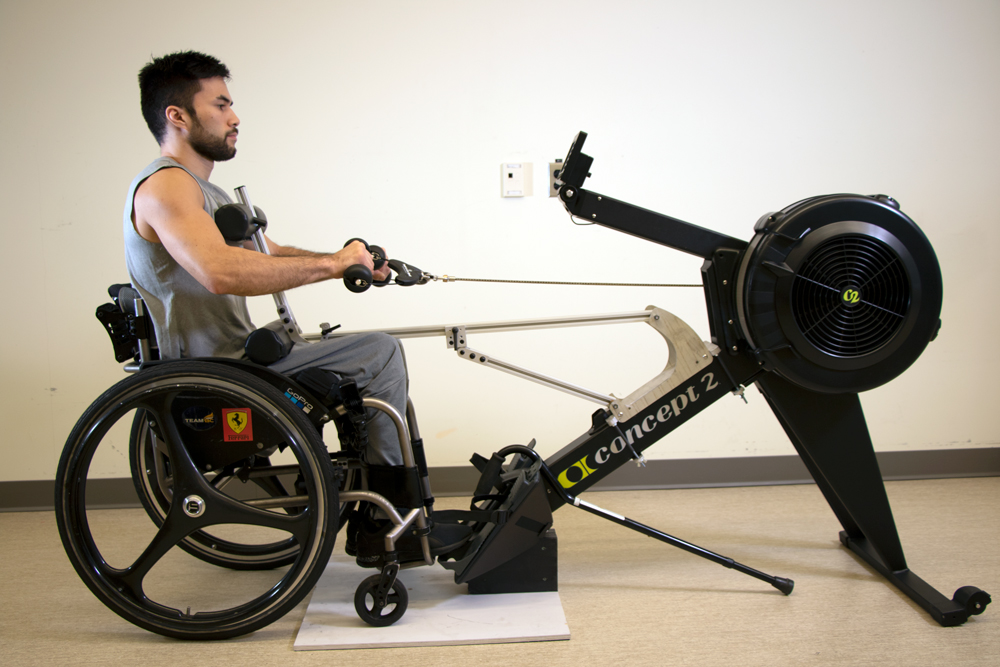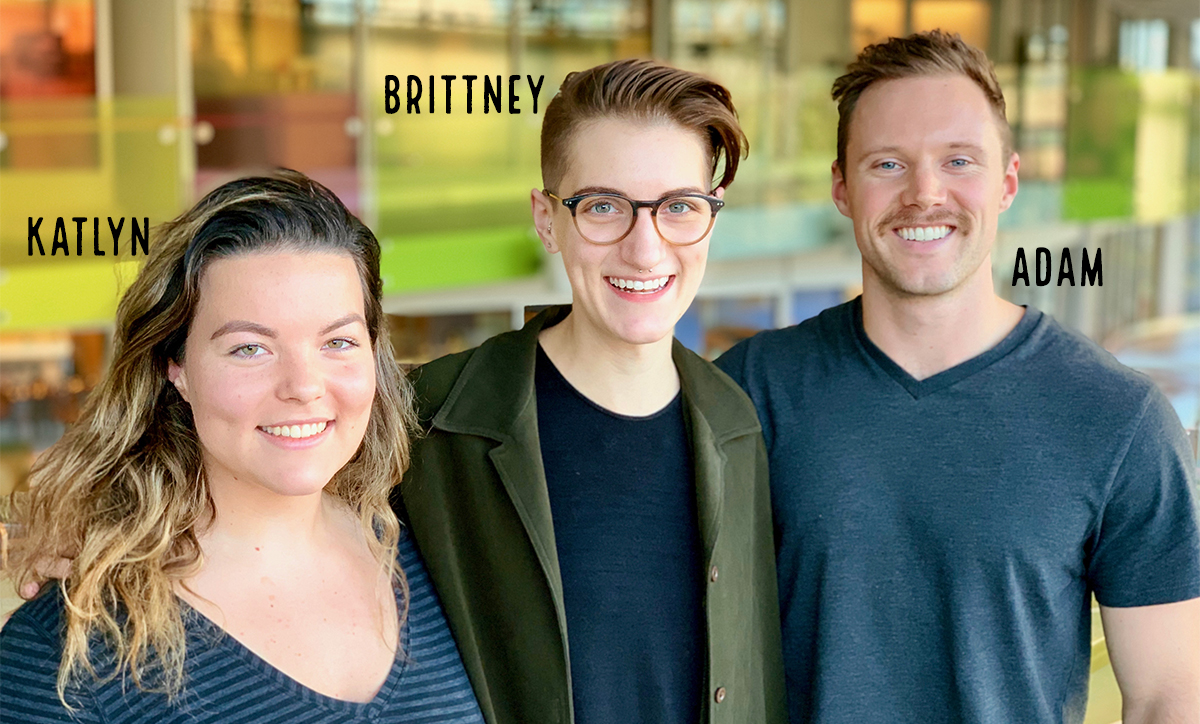
Nov 29, 2019


In this issue, we meet some new researchers, hear about a potential new fitness option, and get an update on what’s happening at PARC. Plus: we ask for your suggestions, introduce you to some great students, and share some news from our partners.

Since the spring, five new researchers have joined ICORD as principal investigators. We’re excited to introduce you to two of them in this issue. Dr. Andrea Bundon is an assistant professor in the UBC School of Kinesiology. She does research in the area of people with disabilities and sport participation, and has taken over as the Faculty Advisor for our Physical Activity Research Centre (PARC). Dr. Mike Berger is an assistant professor in UBC’s division of Physical Medicine and Rehabilitation. His research focusses on the effects of neurotrauma on the peripheral nervous system.
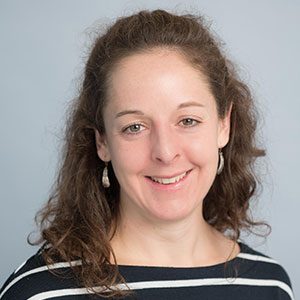 Dr. Andrea Bundon
Dr. Andrea Bundon
“My research explores the intersections between sport, physical activity, disability and social inclusion. I’m particularly passionate about community-based research methodologies that foster strong collaborations between community members and researchers (and that engage community members as researchers and researchers as community members!). I am especially looking forward to talking to the members of the PARC gym about the community that they have created and to explore how we can build more opportunities for more people with spinal cord injuries to be more physically active.”
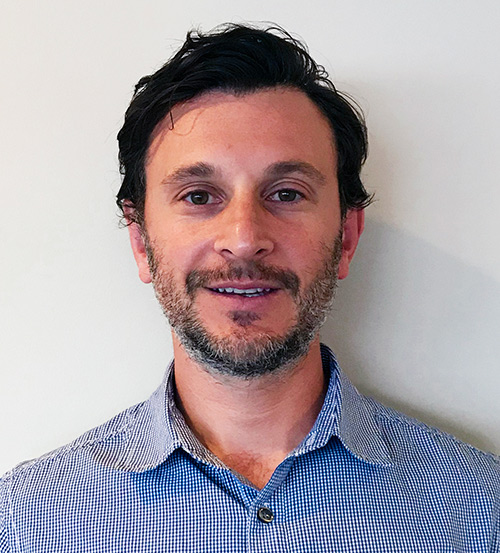 Dr. Mike Berger
Dr. Mike Berger
“I am excited to begin my journey as a new Principal Investigator at ICORD, where I will be examining how nerves and muscles outside of the spinal cord are affected by the injury. ICORD is a special place where research, clinical care and patient advocacy intersect and I am thrilled to be part of all aspects of the SCI continuum.”

ICORD researchers Drs. Bonita Sawatzky, Ben Mortenson, Carolyn Sparrey, and Jaimie Borisoff, and visiting professor Dr. James Laskin, are currently running a study to compare adaptive rowing systems to traditional hand cycle exercise and learn how users feel about the usability of the adaptive rowing system and the traditional arm crank ergometer. People who participate in this study are trained to use an adaptive rowing ergometer and then tested on two separate days to compare how much energy they use on the hand cycle versus the rowing machine at two intensities. After their workouts, the researchers interview participants about their experiences with the two exercise modalities.
Why is this important?
If this study shows that using an adaptive rowing system is as effective in providing a cardiovascular work out, using muscles that are different from those most often used during wheeling, then the adaptive rowing systems could be promoted in the SCI and disability community. This is especially important for people who are not close to accessible gyms, as the ergometer is designed to be attached to standard rowing machines that you find in most gyms.
Want to participate in this study?
Click here for full details!
This study is supported by the Blusson Integrated Cures Partnership through an ICORD seed grant.

ICORD’s social media Work Learn assistant, Jocelyn Chan, recently interviewed three members of the ICORD Trainee Committee (ITC) to learn more about their roles on the ITC, and the research they’re doing. Adam Doelman is the ITC treasurer, Brittney Smalia is the co-chair, and Katlyn Richardson is the co-social coordinator.
 Tell us about your roles on the ITC.
Tell us about your roles on the ITC.
Adam: So far, my primary responsibilities as treasurer have included budget management, organizing financial transactions and ensuring everyone is reimbursed accordingly.
Brittney: As co-chair, I kind of get to have my fingers in all the pies. Right now I’m mostly overseeing events, making sure everything runs smoothly, and acting as a bit of a liaison between people who need connecting. On the whole, I’d say that chairing the trainee committee is primarily about making myself a means through which our team can reach an end – be that a social event, a seminar, a workshop, whatever. My co-chair and I are there to guide, support, and help the team, and I count myself lucky to be working with a team of very competent people who make that job easier.
Katlyn: As one-half of the Social Coordinator position on the ITC this year, my role is to help plan and organize trainee social events. Currently, we are preparing for the Festive Holiday Lunch (hosted jointly with ICORD admin) on Friday, December 6. We’re organizing gingerbread decorating, hot cocoa, and a photo booth to capture people in their best (note: ugliest) holiday sweaters!
 What’s most interesting about being on the ITC?
What’s most interesting about being on the ITC?
Adam: I really enjoy working with the ITC because I’m involved with all of the different events simultaneously and am able to provide extra help wherever necessary. The ITC has also been a great way to meet many of the awesome people who work here at ICORD.
Brittney: The cheesy answer – and it’s true, really – is getting to meet and work with so many people around ICORD that I probably wouldn’t have interacted with otherwise. ICORD, both this building itself and the larger collaborative space it represents, is filled with myriad interesting people in different stages of life, from different backgrounds, with different knowledge sets and experiences. It’s awesome. The less cheesy answer, but one just as true for me, is that it keeps me on my toes–things go “wrong” all the time, people come up with ideas that are lightyears away from anything I was thinking of, I suddenly find myself with a deadline 24 hours away that only crossed my desk 36 minutes ago… it’s interesting and it’s fun.
Katlyn: I started the position in October so there are a lot of things I have yet to partake in, but I am excited about the overall enthusiasm and expertise of the trainees on council this year. I am looking forward to creating some memorable social events over the course of the next year!
 What kind of science are you doing?
What kind of science are you doing?
Adam: I’m a PhD student in Dr. Brian Kwon’s lab. Right now, I’m focusing on two projects. The first involves analyzing the impact of SCI and other experimental interventions such as dietary change and antibiotic administration on the composition of the gut microbiome. I’ve also been testing the effectiveness of nanoparticle-mediated antioxidant delivery to the spinal cord after injury.
Brittney: I’m a masters student in Dr. Matt Ramer’s lab, investigating the regenerative potential of the hypoxia response pathway after injury. More specifically, I’m inhibiting a group of proteins that regulate the hypoxia response, thereby increasing activity of that pathway. Then I’m observing the effects of that increased hypoxia-like activity on axonal regeneration and functional recovery after peripheral nerve injury, and elucidating the mechanisms underlying those effects. Basically I’m tricking nerves into growing faster by lying to them about how much oxygen they have.
Katlyn: I am a PhD candidate in Dr. David Granville’s lab. My research is currently focused on investigating the role of granzymes in skin inflammation, disease and wound healing.
 Have you thought about career plans?
Have you thought about career plans?
Brittney: What I tell family members (when they inevitably ask over Christmas dinner) is that I intend to pursue a PhD (fortunately no one ever asks in what), and eventually carve my niche in academia. For now, I’m focused on finishing up this master’s degree, and after that, I’m terribly excited to enter the great unknown! I’ve got specific goals and things I want to do, but life’s a journey and seldom happens the way you expect it to. So, while I’ll continue to trudge along the rough path I’ve got in my head, I fully expect that new, shiny things will catch my attention along the way and take me down paths I had never considered.
Katlyn: At this point in time I see myself pursuing a career related to dermatology. However, I am trying to keep all my doors open. I like interacting with people, so I see myself in a role most suited to that. I am also passionate about science communication and interdisciplinary projects.
 What do you like to do when you’re not in the lab?
What do you like to do when you’re not in the lab?
Adam: I recently joined a men’s league hockey team on the North Shore and really enjoy playing on Sunday nights. I also like to explore different areas of Vancouver, whether I’m hiking, cycling or checking out a new restaurant or bar.
Katlyn: When not in the lab, I can be found on the beach in Cabo San Lucas, on the soccer pitch, or hitting up happy hour with friends at a local restaurant.

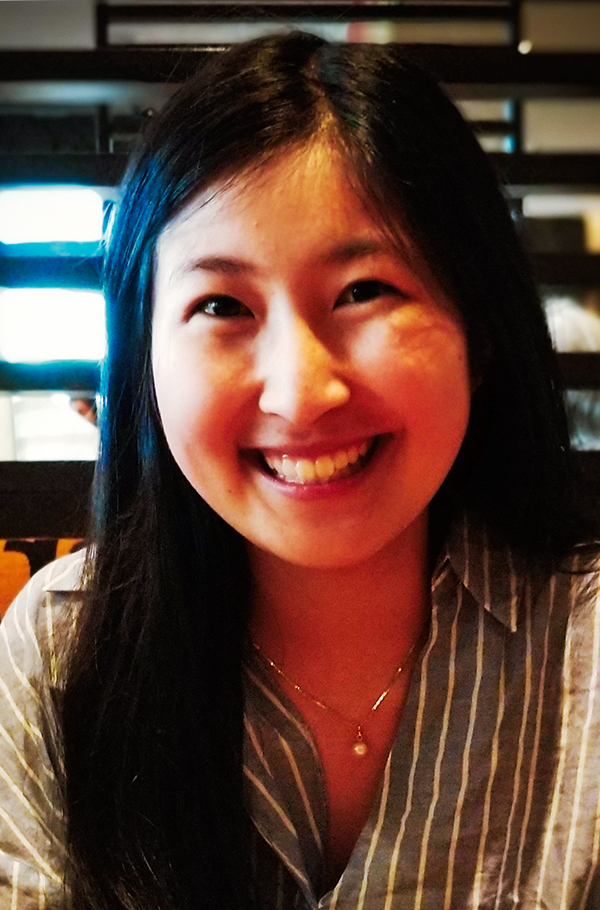 It’s been an exciting Fall at ICORD’s Yuel Family Physical Activity Research Centre (PARC). After overseeing all aspects of PARC and nurturing its growth since 2012, Faculty Advisor Dr. Tania Lam passed the leadership torch to Dr. Andrea Bundon (who you met in the article above). Long-time Work Learn student Sharon Jang, who worked as part-time PARC coordinator, graduated and moved to a new (full time) job in a related field, where her experience at PARC will come in handy! Work Learn student Christine Hsin (pictured, right) took over as Operations Coordinator in September. PARC rolled out a new personal training program in September, and currently has six other programs running (adaptive yoga, spin, boxercise, ping pong, wheelchair dance, and massage). As an investment to
It’s been an exciting Fall at ICORD’s Yuel Family Physical Activity Research Centre (PARC). After overseeing all aspects of PARC and nurturing its growth since 2012, Faculty Advisor Dr. Tania Lam passed the leadership torch to Dr. Andrea Bundon (who you met in the article above). Long-time Work Learn student Sharon Jang, who worked as part-time PARC coordinator, graduated and moved to a new (full time) job in a related field, where her experience at PARC will come in handy! Work Learn student Christine Hsin (pictured, right) took over as Operations Coordinator in September. PARC rolled out a new personal training program in September, and currently has six other programs running (adaptive yoga, spin, boxercise, ping pong, wheelchair dance, and massage). As an investment to 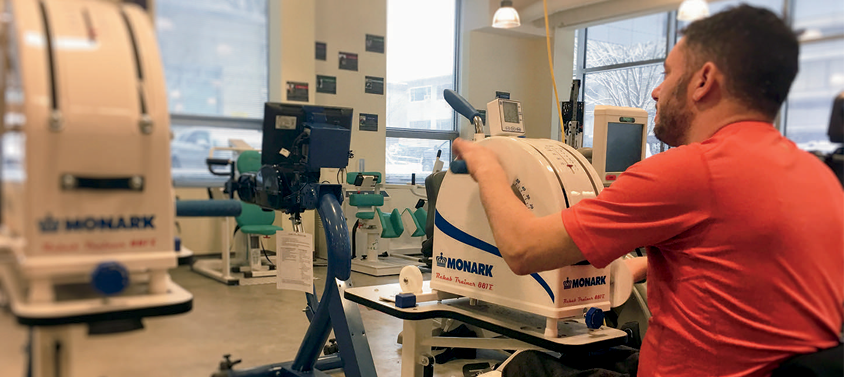 better meet the needs of this growing program that includes 205 active participants, six student Work Learn staff members, and 50 volunteers, we are in the process of hiring a full time PARC manager. We hope to introduce you to the new manager, who will be responsible for ongoing management and expansion of the facility and programs, in our next issue!
better meet the needs of this growing program that includes 205 active participants, six student Work Learn staff members, and 50 volunteers, we are in the process of hiring a full time PARC manager. We hope to introduce you to the new manager, who will be responsible for ongoing management and expansion of the facility and programs, in our next issue!

We’re planning to host another Community Research Night next March, to coincide with our 2020 Annual Research Meeting. Do you have any burning questions about SCI that our researchers can answer at this event? Do you have suggestions for discussion topics? Please let us know!
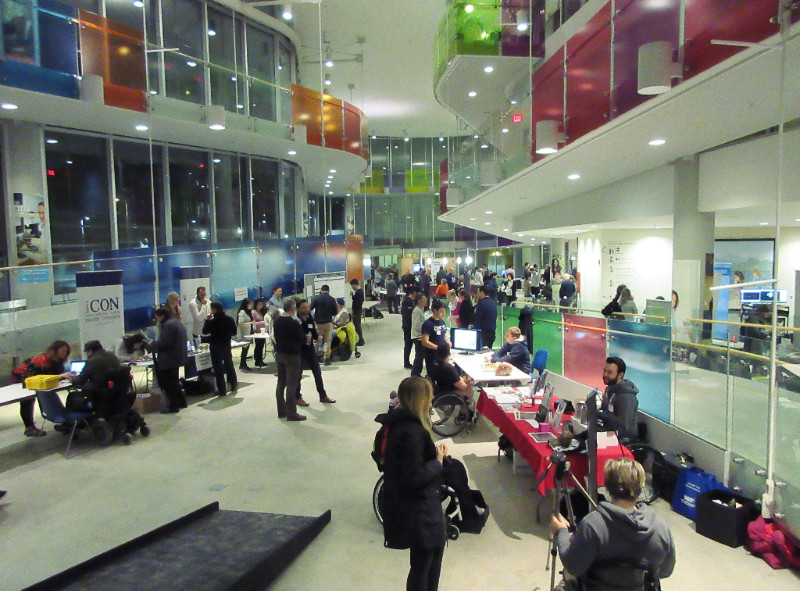 Our last community research night (February, 2018)
Our last community research night (February, 2018)

We’re now accepting applications for next year’s summer research program for Indigenous youth, and we’re excited to be partnering with the UBC School of Biomedical Engineering to offer at least seven placements in 2020. If you know anyone who might be interested in learning about SCI research and biomedical engineering, please let them know about this paid summer program!
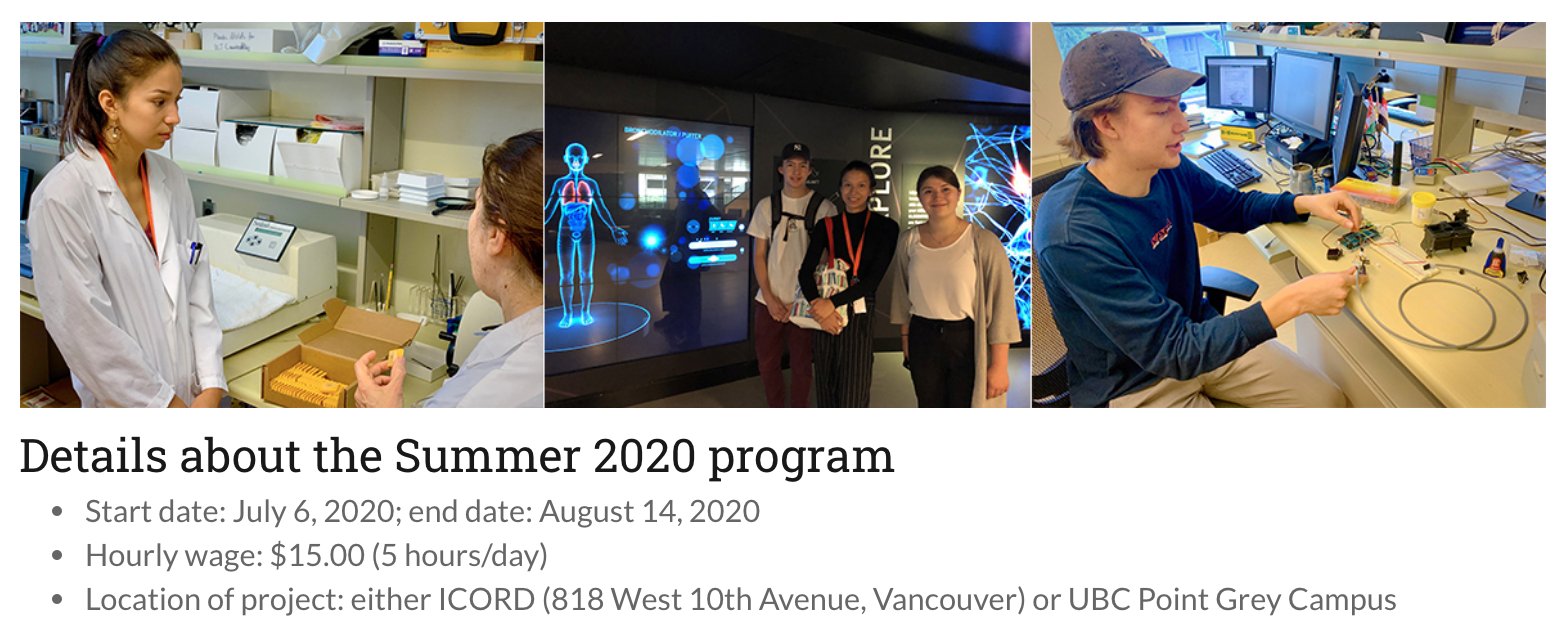

Interested in helping ICORD researchers make SCI preventable, livable, and curable? This research study (and more) is in need of participants!
Cigarette smoking and smoking cessation
Researchers in Dr. Heather Gainforth’s lab, in partnership with SCI BC, are conducting a study aimed at understanding barriers and facilitators experienced by people with SCI while trying to stop cigarette smoking. Participants need to complete a survey and telephone interview. Click here for more details!
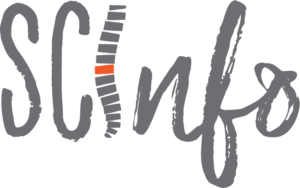 Did you know that volunteers at our SCI Community Resource Centre prepare summaries of scientific papers and post them on our SCInfo blog? If you’re interested in what’s going on in SCI research around the world, this is a good place to look.
Did you know that volunteers at our SCI Community Resource Centre prepare summaries of scientific papers and post them on our SCInfo blog? If you’re interested in what’s going on in SCI research around the world, this is a good place to look.
We are excited to introduce a new series of web comics created by Adam Mesa. What topics would you like to see?



The Blusson Spinal Cord Centre will be closed to the public from December 21 to January 5 inclusive. PARC will be closed for the holidays starting two days earlier, on December 19.
The Community Resource Centre desk will have irregular hours during the month of December as most of our volunteers are UBC students who will be writing exams this month!
Best wishes for the holidays from all of us at ICORD!

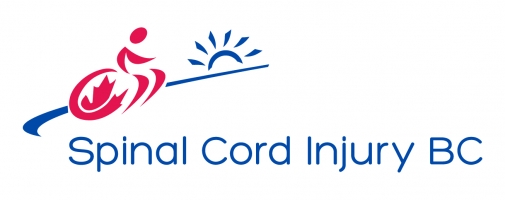 Celebrate the holidays with SCI BC!
Celebrate the holidays with SCI BC!
by Alison Brierley, Communications Specialist, Spinal Cord Injury BC
SCI BC’s annual online holiday auction is taking place until December 1. We have a lot of great auction items online already with all proceeds going towards our program and services.

ALSO: The Lower Mainland Peer Holiday Party is happening on December 12 at the Blusson Spinal Cord Centre. Click here for full details.
 Accessibility Professional Network
Accessibility Professional Network
by Hana Cairns, Marketing and Communications Manager, Rick Hansen Foundation
The Accessibility Professional Network connects people who work, or have an interest, in the field of accessibility with each other and to important resources. Members of the Network get exclusive access to educational resources including webinars, professional development and networking opportunities, an industry job board, and an online discussion forum to discuss critical topics in the field of accessibility. The Network currently has over 200 members and continues to grow as the urgent need for accessible spaces and inclusive environments remains priority for organizations and people across the country.
To join the Accessibility Professional Network, visit RickHansen.com/APN. Membership is free until the end of 2019.
 The Rick Hansen Institute is now Praxis Spinal Cord Institute
The Rick Hansen Institute is now Praxis Spinal Cord Institute
by Carey Lee, Marketing and Network Engagement Lead, Praxis
We’re excited to share our new look and website with the SCI community. We may look different, but our commitment to SCI research, innovation and care is as unwavering as ever. We will continue to advance groundbreaking ideas that can be put into practice, making lives better. In fact, that’s what our new name means. Praxis is the practical application of a theory – it’s about moving knowledge into action. The icon in our new logo is based on a cross-section of vertebrae. It reveals an image that resembles a butterfly—a beautiful symbol of hope that captures our relentless pursuit for superior solutions. Visit our revamped website at www.praxisinstitute.org to learn more.

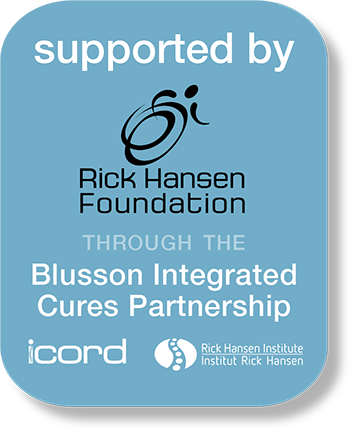 ICORD and the Praxis Spinal Cord Institute are working together to identify new treatments for SCI and apply existing treatments for other neurological disorders, injuries and diseases to SCI. Funded by the Rick Hansen Foundation, the Blusson Integrated Cures Partnership provides ten years of stable funding for several multi-year research projects as well as new faculty positions within ICORD, international exchanges to encourage collaboration, research-related events (like the Annual Research Meeting and seminar series) and a consumer engagement strategy which aims to provide people with SCI and their supporters with evidence-based information about the healthcare, services and resources available to best support recovery after SCI and increase consumer involvement in the research process.
ICORD and the Praxis Spinal Cord Institute are working together to identify new treatments for SCI and apply existing treatments for other neurological disorders, injuries and diseases to SCI. Funded by the Rick Hansen Foundation, the Blusson Integrated Cures Partnership provides ten years of stable funding for several multi-year research projects as well as new faculty positions within ICORD, international exchanges to encourage collaboration, research-related events (like the Annual Research Meeting and seminar series) and a consumer engagement strategy which aims to provide people with SCI and their supporters with evidence-based information about the healthcare, services and resources available to best support recovery after SCI and increase consumer involvement in the research process.
We are very grateful for this generous support.
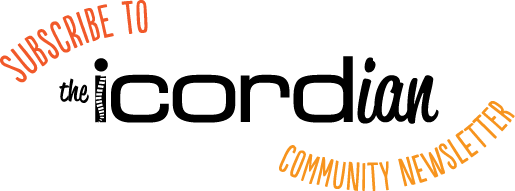
Thanks for reading this issue of The ICORDian – we hope you enjoyed it! Please subscribe and have future issues delivered to your inbox. If you have any comments about this issue or suggestions for future ones, please contact us.

Jocelyn Chan, Brittney Smaila, Katlyn Richardson, Adam Doelman, Andrea Bundon, Alison Brierley, Hana Cairns, Carey Lee, Adam Mesa, and Mike Berger for their contributions to this issue of our newsletter.

